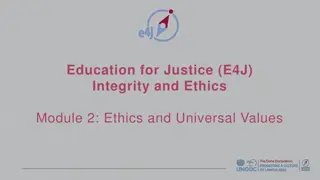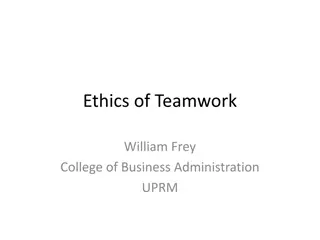Social Work Code of Ethics and Values
Professional code of conduct in social work, focusing on ethical principles, standards, and the importance of values in upholding the profession's commitment to ethical practice
Download Presentation

Please find below an Image/Link to download the presentation.
The content on the website is provided AS IS for your information and personal use only. It may not be sold, licensed, or shared on other websites without obtaining consent from the author.If you encounter any issues during the download, it is possible that the publisher has removed the file from their server.
You are allowed to download the files provided on this website for personal or commercial use, subject to the condition that they are used lawfully. All files are the property of their respective owners.
The content on the website is provided AS IS for your information and personal use only. It may not be sold, licensed, or shared on other websites without obtaining consent from the author.
E N D
Presentation Transcript
Social Work Code of Ethics By: Florence F. Pasos, RS, MSW
Outline of Presentation: Context Values Purposes Ethical Principles Ethical Standards
Code a set of laws; regulations; a system Ethics morals; moral values; moral principles
A code of ethics reflects a professional code of conduct developed by a profession. Social work as a profession has its own code of ethics.
Context The mission of the social work profession is based on a set of values, which serve as the foundation of social work s unique purpose. Professional ethics are based on the social work values, hence, it reflects the commitment of all social workers to uphold the profession s values and act ethically.
Context Ethical awareness is a necessary part of the professional practice of any social worker . The social worker s ability to act ethically is an essential aspect of the quality of the service offered to clients. TLM, 566
Framework Of Social Work Social Work Goal: Enhancement of man s social functioning Individuals, Groups, Communities Social Administration Social Research Social Action Why (Knowledge) What (Philosophy) Theories: ex. Personality, Learning, Social Role, Culture, Systems, Communication, Small Group, Organization, the Community, Feminist, etc. Values View about man Assumptions Ministry Perspective Desirability in our Hearts How (Social Work Practice) Goal Helping Process Functions Helping Models and Approaches Elements Tools in Problem-Solving Skills Ethical Principles and Standards
Self-Realization Each person has the right to self-fulfilment
Social Responsibility Each person has the obligation to seek ways of self-fulfilment as a member of society to contribute to the common good Society has the obligation to facilitate the self- fulfilment of the individual and the right to enrichment through the contribution of its individual members
Equal Opportunities Each person requires socially provided and socially safeguarded opportunities for satisfying his basic needs in the physical, psychological, economic, cultural, aesthetic and spiritual realms Social Justice = fairness and equality
Social Provision To permit both self-realization and contribution to society by the individual, social organizations must make available socially-provided devices for needs satisfaction as wide in range, variety and quality as the general welfare allows
Principles of Social Work 1. Acceptance of people as they are 2. Participation of the client in problem- solving 3. Self-Determination as a right of the client 4. Individualization of clients 5. Confidentiality 6. Worker Self-Awareness 7. Client-Worker Relationship
Background International Federation of Social Workers (IFSW) founded in 1928 in Paris at the first international conference on Social Work- a global organization representing 90 countries and 750,000 social workers
Background National Association of Social Workers (NASW) founded in 1955, an association of social workers in the United States 145,000 members
Background Philippine Association of Social Workers (PASWI) -Founded in 1947 - Worked for the passage of RA 4373, an act to regulate the practice of Social Work And the operation of social work agencies in the Philippines (amended by RA 5175) - a member of the IFSW
The Social Work Code of Ethics Ethics of Social Work Principles and Standards Adopted by the International Federation of Social Workers (IFSW) General Meeting in Colombo, Sri Lanka on July 6-8, 1994
The Social Work Code of Ethics 2 documents of the Ethics of Social Work: International Declaration of Ethical Principles of Social Work International Ethical Standards for Social Workers
Compliance The International Declaration of Ethical Principles assumes that both member associations of the IFSW and their constituent members adhere to the principles formulated therein.
Purposes of the International Declaration of Ethical Principles to formulate a set of basic principles of social work which can be adapted to cultural and social settings to identify ethical problem areas in the practice of social work to provide guidance as to the choice of methods for dealing with ethical issues/problems
The Principles Every human being has a unique vale, which justifies moral consideration for that person
The Principles Each individual has the right to self- fulfillment to the extent that it does not encroach upon the same right of others, and has the obligation to contribute to the well-being of society
The Principles Each society, regardless of its form, should function to provide the maximum benefits for all of its members
The Principles Social workers have a commitment to principles of social justice
The Principles Social Workers have the responsibility to devote objective and disciplined knowledge and skill to aid individuals, groups, communities and societies in their development and resolution of personal-societal conflicts and their consequences
The Principles Social Workers are expected to provide the best possible assistance to anybody seeking their help and advice, without unfair discrimination on the basis of gender, age, disability, color, social class, race, religion, language, political beliefs, or sexual orientation
The Principles Social Workers respect the basic human rights of individuals and groups as expressed in the United Nations Universal Declaration of Human Rights and other international conventions derived from the declaration
The Principles Social Workers pay regard to the principles of privacy, confidentiality and responsible use of information in their professional work. Social workers respect justified confidentiality even when their country s legislation is in conflict with this demand
The Principles Social Workers are expected to work in full collaboration with their clients, working for the best interests of the clients but paying due regard to the interest of others involved. Clients are encouraged to participate and should be informed of the risks and likely benefits of proposed courses of action
The Principles Social Workers generally expect clients to take responsibility, in collaboration with them for determining courses of action affecting their lives.
The Principles Social work is inconsistent with direct or indirect support of individuals, groups, political forces or power structures suppressing their fellow human beings by employing terrorism, torture or similar brutal means
The Principles Social workers make ethically justified decisions and stand by them, paying due regard to the IFSW International Declaration of Ethical Principles and to the International Ethical Standards for Social Workers adopted by their national professional association
International Ethical Standards for Social Workers On the basis of the International Declaration of Ethical Principles of Social Work, the social worker is obliged to recognize these standards of ethical conduct
International Ethical Standards for Social Workers general standards of ethical conduct (10) social work standards relative to clients (4) social work standards relative to agencies and organizations (5) social work standards relative to colleagues (5) standards relative to the profession (5)
General Standards of Ethical Conduct Seek to understand each individual client and the client system, and the elements which affect behavior and the service required
General Standards of Ethical Conduct Uphold and advance the values, knowledge and methodology of the profession refraining from any behavior which damages the functioning of the profession
General Standards of Ethical Conduct Recognize professional and personal limitations
General Standards of Ethical Conduct Encourage the utilization of all relevant knowledge and skills
General Standards of Ethical Conduct Apply relevant methods in the development and validation of knowledge
General Standards of Ethical Conduct Contribute professional expertise to the development of policies and programs which improve the quality of life in society
General Standards of Ethical Conduct Identify and interpret social needs
General Standards of Ethical Conduct Identify and interpret the basis and nature of individual, group, community, national and international social problems
General Standards of Ethical Conduct Identify and interpret the work of the social work profession
General Standards of Ethical Conduct Clarify whether public statements are made or actions performed on an individual basis or as representative of a professional association, agency or organization or other group.
Social Work Standards Relative to Client Accept primary responsibility to identified clients, but within limitations set by the ethical claim of others
Social Work Standards Relative to Client Maintain the client s right to a relationship of trust, privacy and confidentiality. Client is informed on the collection and sharing of information. Client has access to social work records concerning him/her
Social Work Standards Relative to Client Recognize and respect the individual goals, responsibilities and differences of clients. Within the scope of the agency and the client s social milieu, the social worker shall assist clients to take responsibility for personal actions and help them with equal willingness.
Social Work Standards Relative to Client Help the client individual, group, community, or society to achieve self- fulfillment and maximum potential within the limits of the respective rights of others. Help the client understand and use the professional relationship for the client s legitimate desires and interests.
Social Work Standards Relative to Agencies and Organizations Work and cooperate with those agencies ad organizations whose policies, procedures and operations are directed toward adequate service delivery and encouragement of professional practice consistent with the ethical principles of the IFSW
Social Work Standards Relative to Agencies and Organizations Responsibly execute the stated aims and functions of the agency or organizations, contributing to the development of sound policies, procedures and practice in order to obtain the best possible standards of practice























